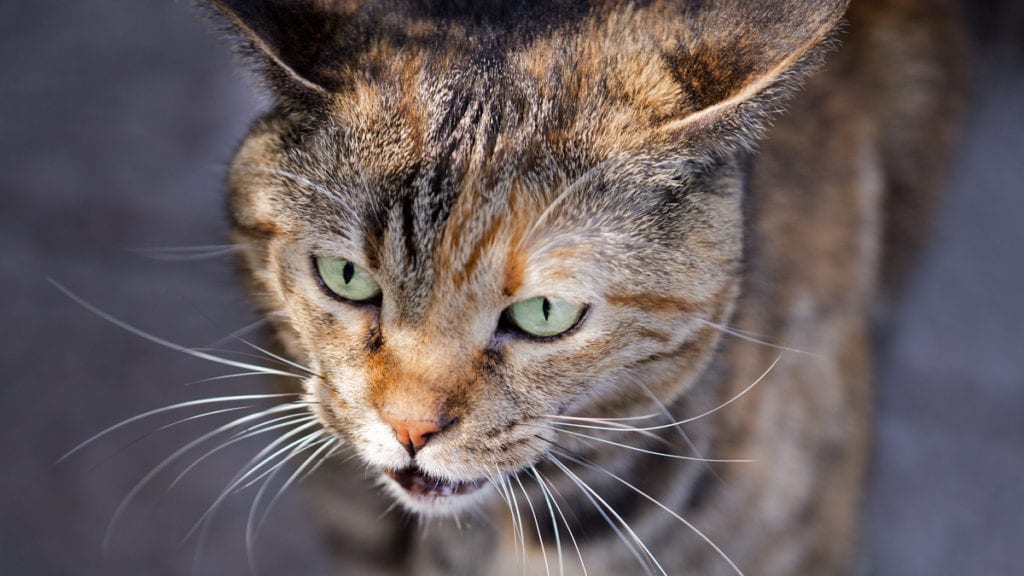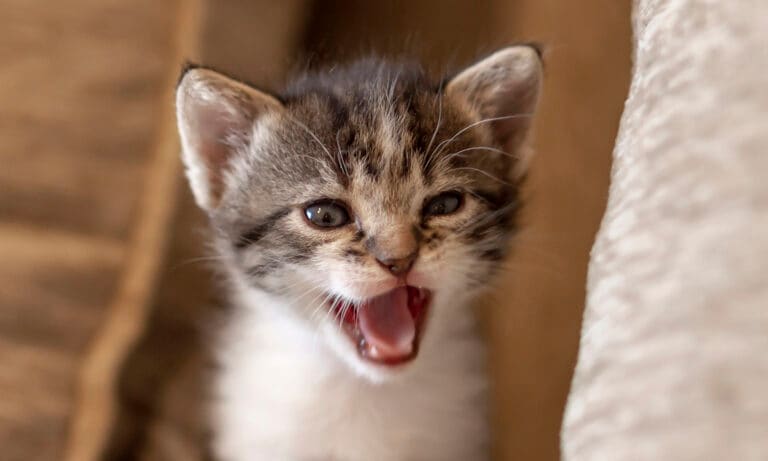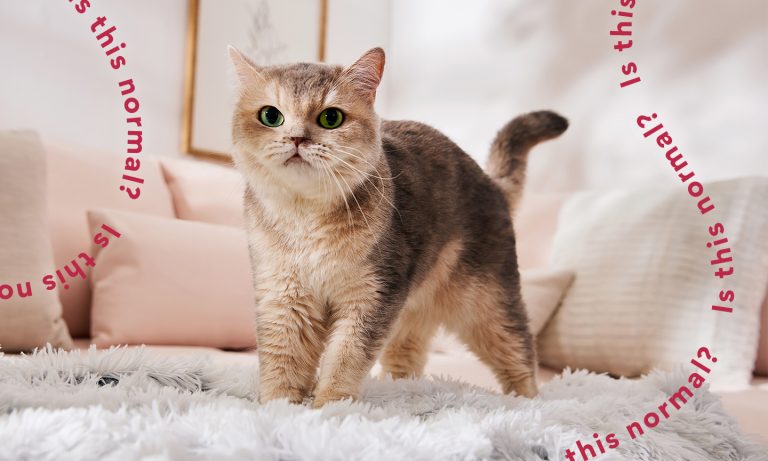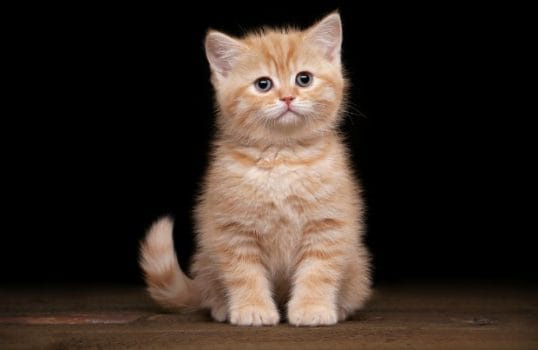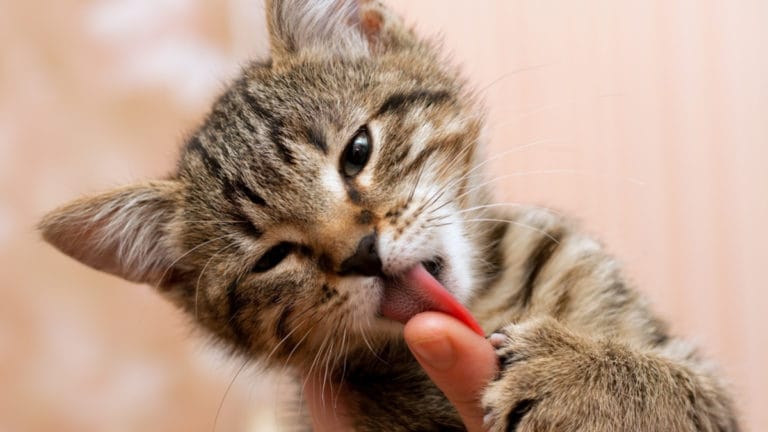Cats can be very chatty—and each noise means something different. Kittens mewl to their mother when they want to nurse. Grown-up cats meow to their owners to say, “Wake up and feed me!” Cats hiss at other animals when they feel threatened. And cats searching for a mate howl loudly—all night long!
So why do cats meow? The simple answer is: to communicate! Here are five reasons why cats love to chat—and what you can do about it if the meowing is excessive.
Cats meow to be fed: “A cat’s meow may be their way of connecting with you and letting you know they want to be fed,” explains Dr. Rachel Barrack, a licensed veterinarian and certified animal acupuncturist. A meow can feel like a “thank you!” for refilling your kitty’s kibble bowl—but a cat meowing for cat food can quickly get out of control. Some cats are so food-focused that they’ll start to wail for food the moment the sun rises or the instant you return from work.
Your cat may also meow because she’s thirsty. Make sure you clean and refill your cat’s water dish often. Cats are naturally drawn to moving water; the Drinkwell 360 Stainless Steel Pet Fountain, which holds a gallon of water, encourages hydration by mimicking natural water sources. The stainless steel container also resists bacteria and is dishwasher-safe.
Be cautious about encouraging your cat to talk for food or water, and if it’s already become a problem, don’t feed your cat when she cries. “It’s important you teach your cat to be polite when she’s hungry,” explains Dr. Barrack, who recommends waiting until she quiets down to feed her. Punishing your cat for talking—by yelling, hitting or spraying with water—doesn’t and will only make the animal fear and distrust you.
Cats meow when they want to play: Despite a reputation as solitary animals, many cats love to play and interact with humans and other animals. Your cat may meow when she wants you to pay attention to her. Other behavioral cues include rolling over to show her belly and rubbing up against your legs. A meow may mean, “Pet me! Cuddle me! Play with me!”
Again, a cat talking for attention can become annoying, so if your cat has crossed the threshold from cute to obnoxious, don’t give her attention when she meows. Wait until she’s quiet and then shower her with affection and fun. Cats are also less needy when they’ve been well-exercised. Encourage your cat to move with a laser pointer or a fishing pole-type toy.
Cats meow when they are stressed: “Cats who are closely bonded to their owners may experience distress when their owners are not around,” says Dr. Barrack. Cats also may start talking more if they are upset by life changes, like a move or a new baby in the house. If your cat seems anxious, consider behavioral modifications.
The Sentry HC Good Behavior Pheromones Calming Collar uses a pheromone that mimics the one mothers produce to calm their kittens. This collar is clinically proven to reduce or eliminate stress-related behavior such as inappropriate marking, destructive behavior, clawing and anti-social behavior. Pet Naturals of Vermont Calming Cat Chews are delicious cat treats that contains L-theanine, vitamin B1, and a colostrum calming complex that is clinically shown to support normal chemical complexes in the brain and calm the central nervous system.
You could also try adopting another pet, hiring a pet sitter to drop in and say hello during the workday, putting a bird feeder outside a window, getting a scratch pad or kitty condo, or serving her meals inside “puzzle toys” that encourage her to work for her food. “If your cat seems lonely, make sure you spend time with your cat to let her know you love her!” says Dr. Barrack.
Cats meow because they are excited: If your cat goes from lazily snoozing to running around the house like she’s possessed, she has the ‘zoomies.’ Cats get these spurts of energy—which are often accompanied by excessive meowing—for many reasons. Your cat may be zooming around because she saw a dog outside, she caught scent of a mouse, or she simply has energy to burn. Cats may also have the zoomies because they have fleas or an underlying medical condition, so be sure to rule out more serious causes if your cat seems distressed.
A cat makes sounds to communicate with other animals: Kittens meow for their mothers, but grown cats don’t truly meow at each other. A grown-up cat reserves meowing for human interaction and prefers to use body language (flattened ears when angry or an exposed belly when feeling playful) with other animals.
Cats may hiss at each other to say, “I feel threatened!” or “I’m the boss, get out of my way!” If their interaction escalates to a fight, they’ll howl as they duke it out. Cats that haven’t been spayed or neutered may make a lot of yowling cat sounds. Females are extremely vocal when in heat, and male cats yowl when they smell a potential mate.
Cats meow for medical reasons: There are many diseases that can cause different cat sounds. “If your cat is meowing uncontrollably—such as crying or excessive loudness—they may be in pain, ill or even be suffering from Cognitive Dysfunction Syndrome (CDS),” says Dr. Barrack. Additionally, cats with an overactive thyroid or kidney issues often make a lot of noise. If you suspect your cat’s excessive meowing has a medical explanation, consult your veterinarian for advice.
“Some senior animals lose their hearing, so their loud meowing is to try to hear their own noises,” adds Dr. Barack. Older cats may increase their cat sounds at night because they can’t see as well, so consider leaving some lights on when you go to bed.
Share:
